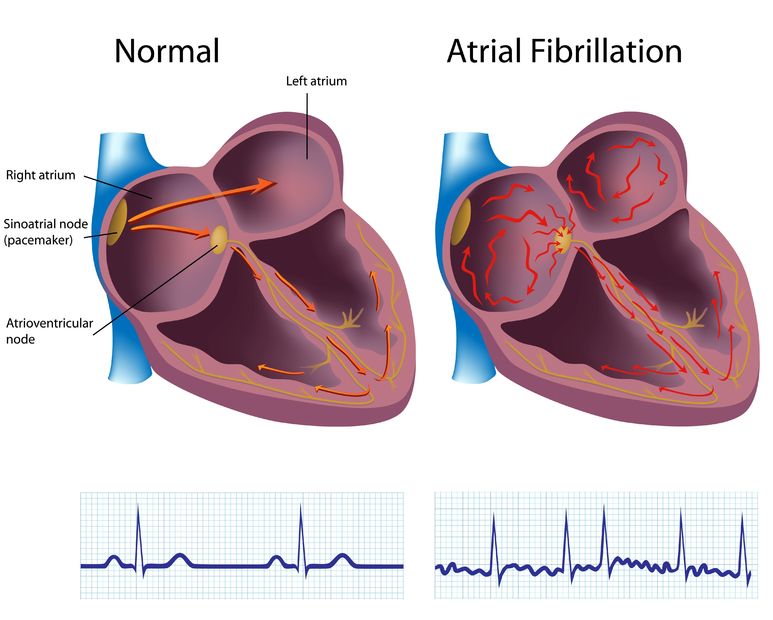


If you have a persistent irregular heart rhythm, the only test you might need is an electrocardiogram, also called an EKG or ECG.ĭuring this test, we attach sticky metal discs called electrodes to your chest.
#Atrial flutter vs afib full#
I guess one other similarity that I think is particularly important is both atrial fibrillation and atrial flutter will increase the risk of stroke and the indications for blood thinners are the same regardless of whether a patient has atrial fibrillation or atrial flutter.The UI Heart and Vascular Center offers the full range of tests used to diagnose Afib. So in your case I would concentrate on treating atrial fibrillation and not focus on atrial flutter at this point. And in patients who have about equal amount of atrial fibrillation to atrial flutter, those patients are treated as if they only have atrial fibrillation. It sounds like in your case, you have both atrial fibrillation and atrial flutter. And if that patient is also susceptible to atrial flutter which can start up atrial flutter which typically will continue for hours to days to weeks until something's done to stop it. So a patient will have a brief burst of atrial fibrillation. And that can be explained by the fact that patients who have atrial flutter also commonly have some amount of atrial fibrillation that triggers the episodes of atrial flutter. And the question is why do you have both atrial fibrillation and atrial flutter. So I think atrial fibrillation and flutter, you know they're similar in some respects, they're different in other respects. Catheter ablation is very successful and curative for many patients with atrial flutter, particularly if they have only atrial flutter and almost no or no atrial fibrillation.Ĭonversely catheter ablation, it plays a much smaller role in the treatment of atrial fibrillation the procedure is more difficult it's more risky and it has a lower success rate. Now I think the most important difference between atrial flutter and atrial fibrillation is how they're treated in the role of catheter ablation. So typically atrial fibrillation will cause an irregular heart beat. Now atrial fibrillation is much faster than atrial flutter, and it's also much more chaotic than atrial flutter. But patients who have atrial flutter usually have a very regular heart beat. The lower chamber will always goes at a much lower than that. But there are very important differences between atrial fibrillation and atrial flutter - both in terms of the precise mechanism of the arrhythmia, but also how they're treated.Ītrial flutter is an organized regular rapid upper chamber rhythm that goes in almost all patients at about 300 beats a minute - typically between 250 and 350 beats per minute in the upper chamber of the heart. So in both cases you'll want to think about blood thinners. And they also both can cause symptoms and increase the risk of stroke. What is the difference between these two heart rhythm problems and why do I have both of them?Īnswer :So atrial fibrillation atrial flutter are similar arrhythmia in that they both occur in the upper chamber and both cause the upper chamber to beat very rapidly. — - Question: My doctor told me I sometimes have atrial fibrillation and at other times have atrial flutter.


 0 kommentar(er)
0 kommentar(er)
